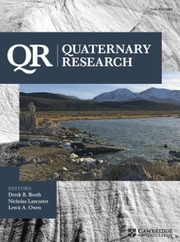Crossref Citations
This article has been cited by the following publications. This list is generated based on data provided by
Crossref.
Washburn, A. L.
1980.
Focus on Polar Research.
Science,
Vol. 209,
Issue. 4457,
p.
643.
Andrews, John T.
1982.
On the reconstruction of pleistocene ice sheets: A review.
Quaternary Science Reviews,
Vol. 1,
Issue. 1,
p.
1.
Johnson, R. G.
1982.
Brunhes-Matuyama Magnetic Reversal Dated at 790,000 yr B.P. by Marine-Astronomical Correlations.
Quaternary Research,
Vol. 17,
Issue. 2,
p.
135.
Barry, R. G.
1983.
Research on snow and ice.
Reviews of Geophysics,
Vol. 21,
Issue. 3,
p.
765.
Royer, Jean François
Deque, Michel
and
Pestiaux, Pierre
1983.
Orbital forcing of the inception of the Laurentide ice sheet?.
Nature,
Vol. 304,
Issue. 5921,
p.
43.
Denton, George H.
and
Hughes, Terence J.
1983.
Milankovitch Theory of Ice Ages: Hypothesis of Ice-Sheet Linkage Between Regional Insolation and Global Climate.
Quaternary Research,
Vol. 20,
Issue. 2,
p.
125.
Harmon, Russell S.
Mitterer, Richard M.
Kriausakul, Nivat
Land, Lynton S.
Schwarcz, Henry P.
Garrett, Peter
Larson, Grahame J.
Leonard Vacher, H.
and
Rowe, Mark
1983.
U-series and amino-acid racemization geochronology of Bermuda: Implications for eustatic sea-level fluctuation over the past 250,000 years.
Palaeogeography, Palaeoclimatology, Palaeoecology,
Vol. 44,
Issue. 1-2,
p.
41.
Boardman, John
1985.
Comparison of Soils in Midwestern United States and Western Europe with the Interglacial Record.
Quaternary Research,
Vol. 23,
Issue. 1,
p.
62.
KELLOGG, THOMAS B.
1986.
Late Quaternary paleoclimatology and paleooceanography of the Labrador Sea and Baffin Bay: an alternative viewpoint.
Boreas,
Vol. 15,
Issue. 4,
p.
331.
Aharon, Paul
and
Chappell, John
1986.
Oxygen isotopes, sea level changes and the temperature history of a coral reef environment in New Guinea over the last 105 years.
Palaeogeography, Palaeoclimatology, Palaeoecology,
Vol. 56,
Issue. 3-4,
p.
337.
KELLOGG, THOMAS B.
1987.
Significance of Labrador Sea and Baffin Bay Waters for growth of the Laurentide Ice Sheet.
Polar Research,
Vol. 5,
Issue. 3,
p.
355.
Schneider, Stephen H.
Peteet, Dorothy M.
and
North, Gerald R.
1987.
Abrupt Climatic Change.
p.
399.
Kellogg, Thomas B.
1987.
Significance of Labrador Sea and Baffin Bay Waters for growth of the Laurentide Ice Sheet.
Polar Research,
Vol. 5,
Issue. 3,
p.
355.
Harvey, L. D. Danny
1988.
On the role of high latitude ice, snow, and vegetation feedbacks in the climatic response to external forcing changes.
Climatic Change,
Vol. 13,
Issue. 2,
p.
191.
Clark, P.U.
Clague, J.J.
Curry, B.B.
Dreimanis, A.
Hicock, S.R.
Miller, G.H.
Berger, G.W.
Eyles, N.
Lamothe, M.
Miller, B.B.
Mott, R.J.
Oldale, R.N.
Stea, R.R.
Szabo, J.P.
Thorleifson, L.H.
and
Vincent, J.-S.
1993.
Initiation and development of the Laurentide and Cordilleran Ice Sheets following the last interglaciation.
Quaternary Science Reviews,
Vol. 12,
Issue. 2,
p.
79.
Little, Mark G.
Schneider, Ralph R.
Kroon, Dick
Price, Brian
Summerhayes, Colin P.
and
Segl, Monika
1997.
Trade wind forcing of upwelling, seasonally, and Heinrich events as a response to sub‐Milankovitch climate variability.
Paleoceanography,
Vol. 12,
Issue. 4,
p.
568.
Johnson, R.G.
1997.
Ice age initiation by an ocean-atmospheric circulation change in the Labrador Sea.
Earth and Planetary Science Letters,
Vol. 148,
Issue. 1-2,
p.
367.
Wang, Zhaomin
Mysak, Lawrence A.
and
McManus, Jerry F.
2002.
Response of the thermohaline circulation to cold climates.
Paleoceanography,
Vol. 17,
Issue. 1,
Marshall, Shawn J.
2002.
Modelled nucleation centres of the Pleistocene ice sheets from an ice sheet model with subgrid topographic and glaciologic parameterizations.
Quaternary International,
Vol. 95-96,
Issue. ,
p.
125.
Jakobsson, Martin
Nilsson, Johan
Anderson, Leif
Backman, Jan
Björk, Göran
Cronin, Thomas M.
Kirchner, Nina
Koshurnikov, Andrey
Mayer, Larry
Noormets, Riko
O’Regan, Matthew
Stranne, Christian
Ananiev, Roman
Barrientos Macho, Natalia
Cherniykh, Denis
Coxall, Helen
Eriksson, Björn
Flodén, Tom
Gemery, Laura
Gustafsson, Örjan
Jerram, Kevin
Johansson, Carina
Khortov, Alexey
Mohammad, Rezwan
and
Semiletov, Igor
2016.
Evidence for an ice shelf covering the central Arctic Ocean during the penultimate glaciation.
Nature Communications,
Vol. 7,
Issue. 1,


